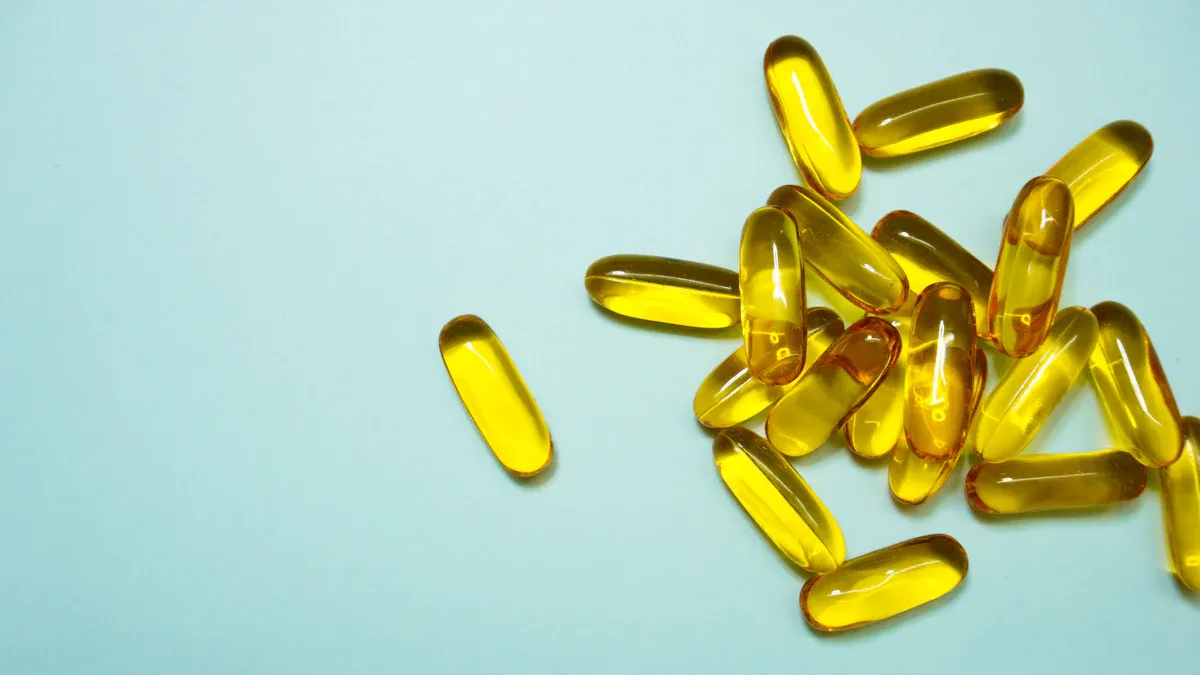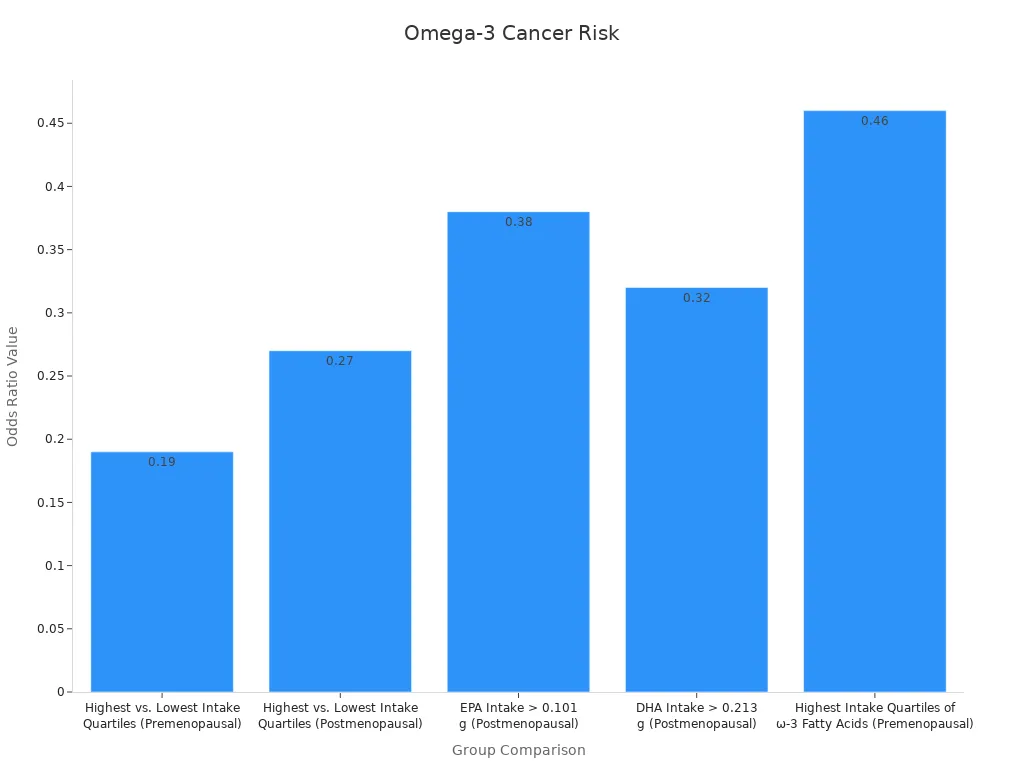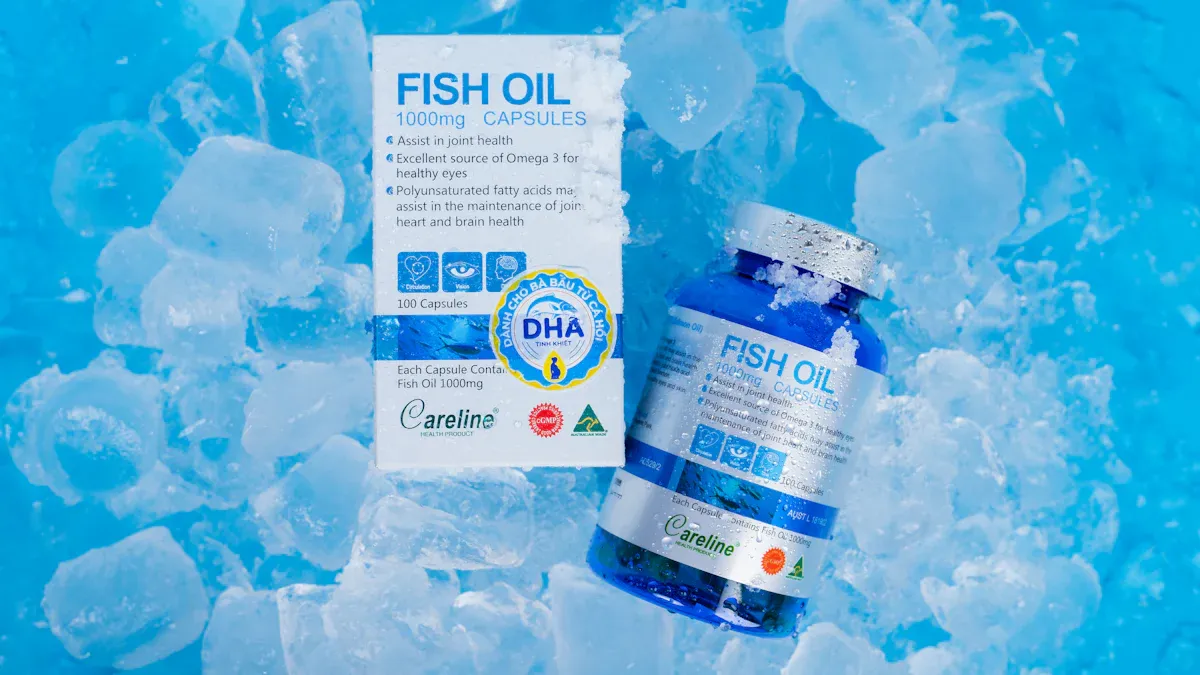How Omega-3 Fatty Acids Support Cancer Prevention and Treatment

Omega-3 fatty acids offer powerful benefits for your health, especially regarding omega 3 and cancer prevention and treatment. These essential fats reduce inflammation, which plays a key role in the development of many cancers. They also help regulate immune responses, making your body better equipped to fight abnormal cell growth.
Studies highlight their impact on cancer risk reduction. For example, a large study of over 35,000 post-menopausal women in the United States revealed that omega-3 supplementation lowered breast cancer risk by 32%. This demonstrates how omega 3 and cancer prevention are closely linked, providing you with a practical way to support your health.
Key Takeaways
Omega-3 fatty acids may help lower cancer risk by reducing swelling and boosting the immune system.
Eating fish like salmon or taking omega-3 pills can help your body fight cancer better.
Adding foods with omega-3 to your meals can improve health and lower cancer chances.
Talk to your doctor before using omega-3 pills to make sure they are safe for you.
Try to eat fatty fish twice a week to get the most omega-3 benefits.
The Science Behind Omega-3 and Cancer
Types of Omega-3s: ALA, EPA, and DHA
Omega-3 fatty acids come in three main types: alpha-linolenic acid (ALA), eicosapentaenoic acid (EPA), and docosahexaenoic acid (DHA). ALA is found in plant-based sources like flaxseeds, chia seeds, and walnuts. Your body can convert ALA into EPA and DHA, but this process is not very efficient. EPA and DHA, which are abundant in marine sources like fish and algae, provide more direct health benefits.
These fatty acids play unique roles in your body. ALA competes with other fats for metabolism, while EPA and DHA influence inflammation by interacting with arachidonic acid. DHA is especially important for your brain, eyes, and cell membranes. Together, these omega-3s contribute to overall health and may help reduce cancer risk.
Mechanisms of Action: Anti-Inflammatory and Anti-Tumor Effects
Omega-3 fatty acids help your body fight inflammation, which is a key factor in cancer development. EPA and DHA, found in seafood and algae, act as precursors for compounds that reduce inflammation. These compounds, called eicosanoids, play a role in regulating immune responses and cell signaling.
Research also shows that omega-3s can alter the composition of cell membranes. This change affects how cells communicate and grow, potentially slowing tumor development. A study published in the International Journal of Cancer found that omega-3s influence lipid pathways, which may protect against certain cancers. However, the same study noted a possible increased risk of prostate cancer with omega-3s, highlighting the need for personalized advice.
Role in Anti-Inflammatory Mechanisms | |
|---|---|
Seafood (e.g., sardines, mackerel, herring, albacore tuna) | Provide EPA and DHA, which are precursors for anti-inflammatory eicosanoid compounds. |
Algae | Source of EPA and DHA, contributing to anti-inflammatory effects. |
The Role of Omega-3s in Immune Modulation
Your immune system plays a critical role in fighting cancer, and omega-3 fatty acids can enhance its function. EPA and DHA, often referred to as immunonutrients, help regulate immune responses. They promote the death of abnormal cells and prevent their growth.
Studies suggest that omega-3s can also reduce oxidative stress, which damages DNA and contributes to cancer. By modulating cell signaling pathways, these fatty acids support your body’s ability to fight cancer at the cellular level. Increased fish consumption, which provides bioactive omega-3s, has been linked to lower cancer risk in epidemiological studies.
Tip: Including omega-3-rich foods like fatty fish or supplements in your diet can support your immune system and overall health.
Omega-3 and Cancer Prevention

Reducing Inflammation and Oxidative Stress
Inflammation and oxidative stress contribute significantly to cancer development. Omega-3 fatty acids help reduce these harmful processes in your body. They lower levels of inflammatory markers like C-reactive protein (CRP) and tumor necrosis factor-alpha (TNF-α). For example:
CRP levels dropped from 2.69 ± 1.34 to 1.42 ± 0.63 (p = 0.001) in individuals consuming omega-3s.
TNF-α levels decreased from 3.74 ± 1.69 to 1.92 ± 0.65 (p = 0.001).
Additionally, omega-3s boost antioxidant activity. They increase the levels of protective enzymes like GPx and HO-1, which shield your cells from oxidative damage. By reducing inflammation and oxidative stress, omega-3s create a healthier environment in your body, lowering your risk of cancer.
Impact on Cell Growth and Tumor Development
Omega-3 fatty acids influence how cells grow and divide. They can slow down tumor development by reducing cell viability and promoting apoptosis (programmed cell death). Research shows that omega-3s decrease the expression of GLUT1 and GLUT4 proteins, which reduces glucose uptake by cancer cells. This limits their energy supply and inhibits growth.
In ovarian granulosa tumor cells, omega-3 intake significantly reduced cell proliferation and increased apoptosis. These effects are linked to the regulation of the transcription factor OCT4, which plays a role in cell survival. By targeting these pathways, omega-3s help prevent abnormal cell growth and tumor formation.
Evidence from Key Studies on Cancer Risk Reduction
Several studies highlight the preventive role of omega-3 fatty acids in reducing cancer risk:
Women with higher intake ratios of marine omega-3s (EPA and DHA) compared to omega-6 arachidonic acid had a lower risk of breast cancer.
Higher blood levels of omega-3s were associated with reduced rates of digestive system cancers, including colon and stomach cancers, as well as lung cancer.
A study also provided numerical evidence linking omega-3 consumption with reduced cancer risk:
Group | Odds Ratio (OR) | 95% Confidence Interval (CI) | p-value |
|---|---|---|---|
Highest vs. Lowest Intake Quartiles (Premenopausal) | 0.19 | [0.08 to 0.45] | < 0.001 |
Highest vs. Lowest Intake Quartiles (Postmenopausal) | 0.27 | [0.11 to 0.66] | 0.005 |
EPA Intake > 0.101 g (Postmenopausal) | 0.38 | [0.15 to 0.96] | N/A |
DHA Intake > 0.213 g (Postmenopausal) | 0.32 | [0.13 to 0.82] | N/A |

These findings emphasize how omega-3s can play a vital role in cancer prevention. Incorporating omega-3-rich foods into your diet may help reduce your risk of developing various cancers.
Omega-3 in Cancer Treatment

Enhancing Chemotherapy and Radiation Outcomes
Omega-3 fatty acids can improve how your body responds to cancer treatments like chemotherapy and radiation. Research shows that EPA and DHA may enhance the effectiveness of these therapies while reducing their side effects. For example:
Patients with metastatic breast cancer who added DHA to their chemotherapy experienced better outcomes without additional side effects.
In lung cancer patients undergoing chemotherapy, omega-3 supplementation improved nutritional status and reduced inflammation.
These fatty acids also help preserve muscle mass and function during treatment. Small studies suggest that omega-3s may increase chemotherapy response rates, making treatments more effective. By incorporating omega-3-rich foods or supplements into your diet, you may support your body’s ability to tolerate and respond to cancer therapies.
Supporting Immune Function During Treatment
Cancer treatments can weaken your immune system, but omega-3 fatty acids may help strengthen it. EPA and DHA regulate immune responses, reducing chronic inflammation and promoting the destruction of abnormal cells. This immune-modulating effect can improve your body’s ability to fight cancer during treatment.
Studies have linked omega-3 intake to improved survival rates and reduced recurrence in breast cancer patients. For colorectal cancer patients, omega-3s have been associated with delayed tumor progression and better chemotherapy tolerance. Including omega-3s in your diet could provide your immune system with the support it needs during this challenging time.
Addressing Cancer Cachexia and Treatment Side Effects
Cancer cachexia, a condition involving severe weight and muscle loss, affects many patients undergoing treatment. Omega-3 fatty acids, particularly EPA, can help combat this issue. Research shows that EPA reduces muscle breakdown and promotes protein synthesis, helping you maintain lean body mass.
In clinical observations, omega-3 supplementation improved functional activity and quality of life in chemotherapy patients. It also increased protein and caloric intake, which are essential for recovery. Animal studies have shown that omega-3s reduce chemotherapy-related side effects like anorexia and weight loss. By addressing these challenges, omega-3s can improve your overall well-being during cancer treatment.
Practical Recommendations for Omega-3 Intake
Top Dietary Sources of Omega-3s
Incorporating omega-3-rich foods into your diet is one of the best ways to support your health. These foods provide essential fatty acids that your body cannot produce on its own. Some excellent sources include:
Fatty fish: Salmon, trout, tuna, sardines, and mackerel are rich in EPA and DHA, the most beneficial forms of omega-3s.
Plant-based options: Flaxseeds, chia seeds, walnuts, and soybeans are great sources of ALA, a type of omega-3 that your body can partially convert into EPA and DHA.
Oils: Avocado oil and olive oil contain small amounts of omega-3s and are easy to include in your meals.
Aim to eat a variety of these foods to maximize your omega-3 intake. For example, adding chia seeds to your breakfast or enjoying grilled salmon for dinner can make a big difference.
Guidelines for Omega-3 Supplementation
If you struggle to get enough omega-3s from food, supplements can help fill the gap. Fish oil supplements, which contain EPA and DHA, are a popular choice. Studies show that taking 1–3 grams of omega-3s daily through supplements may reduce inflammation and lower cancer recurrence risk.
When choosing a supplement, look for products that are third-party tested for purity and potency. Algal oil supplements are a good option if you prefer a plant-based source of omega-3s. Always follow the dosage instructions on the label and consult your healthcare provider before starting any new supplement.
Tip: Supplements are not a replacement for a healthy diet. Use them to complement your intake of omega-3-rich foods.
Recommended Intake Levels for Cancer Prevention and Support
Experts recommend specific intake levels to optimize the benefits of omega-3s for cancer prevention and treatment:
Fatty fish: Consume at least two servings (about 3 ounces each) of fatty fish per week.
Supplements: If needed, take 1–3 grams of omega-3s daily, focusing on EPA and DHA.
Balanced diet: Include omega-3-rich plant-based foods like flaxseeds and walnuts regularly.
Research highlights the importance of maintaining a balance between omega-3 and omega-6 fatty acids. A diet rich in omega-3s and low in omega-6s may protect against cancers like colon, stomach, and lung cancer. For example, a meta-analysis found that a daily dose of 2 grams of EPA reduced the size and number of polyps in patients with familial adenomatous polyposis by 20–30%.
By following these recommendations, you can take proactive steps to support your health and reduce your cancer risk.
Risks and Limitations of Omega-3s
Potential Drug Interactions and Side Effects
While omega-3 fatty acids offer many benefits, they can also cause side effects or interact with medications. You may experience mild issues like a fishy aftertaste or gastrointestinal discomfort, including diarrhea, nausea, or abdominal pain. In some cases, high doses of omega-3s have been linked to more serious concerns, such as atrial fibrillation or an increased risk of bleeding.
If you take blood-thinning medications, omega-3 supplements may elevate your INR (a measure of blood clotting), which could increase bleeding risks. Additionally, omega-3s might enhance the effects of glucocorticoids, potentially worsening their side effects.
Adverse Reaction/Interaction | Description |
|---|---|
Fishy aftertaste | Commonly reported after consuming large doses of omega-3s. |
Gastrointestinal events | Includes diarrhea, nausea, and abdominal pain, especially with EPA intake. |
Atrial fibrillation | Observed in clinical studies with high EPA consumption. |
Elevated INR | Linked to fish oil supplements (2 g/day), with risks decreasing after dose adjustment. |
Risk of bleeding | Associated with high-dose purified EPA, though clinical significance is modest. |
Stomatitis/oral mucositis | Reported with omega-3-enriched supplements in cancer patients. |
To minimize these risks, consult your healthcare provider before starting omega-3 supplements, especially if you are undergoing cancer treatment or taking other medications.
Variability in Effectiveness Across Cancer Types
Omega-3 fatty acids do not affect all cancers in the same way. Their effectiveness can vary depending on the type of cancer and individual factors. For example, while omega-3s have shown promise in reducing the risk of breast and colorectal cancers, studies on prostate cancer have produced mixed results.
The balance between omega-3 and omega-6 fatty acids in your diet also plays a role. A higher ratio of omega-6 to omega-3 has been associated with increased risks of cancer and other diseases. However, the specific roles of these fatty acids in cancer prevention and treatment remain unclear.
Evidence Description | Findings |
|---|---|
The study indicates a strong association between the omega-6/omega-3 ratio and increased mortality risks. | |
Inconsistencies in results regarding omega-6 PUFAs | Most large observational studies support inverse associations between omega-3 PUFAs and mortality. |
Uncertainty in roles of omega-3 and omega-6 PUFAs | Despite extensive research, the specific roles in mortality remain unclear. |
These findings highlight the need for more research to understand how omega-3s work across different cancer types.
Importance of Personalized Medical Advice
Your health needs are unique, and omega-3 supplementation should align with your specific circumstances. Personalized treatment plans can address your individual needs, improving outcomes and quality of life. For example, a tailored approach can help manage symptoms, reduce stress, and enhance your overall well-being during cancer care.
Comprehensive cancer care improves symptom management and reduces stress.
Mixed outcomes from omega-3 supplementation emphasize the need for tailored advice.
Individualized plans ensure that your treatment aligns with your health status and goals.
Before adding omega-3s to your routine, consult your healthcare provider. They can guide you on the right dosage and form of omega-3s based on your medical history and current treatments. This personalized approach ensures that you gain the most benefit while minimizing risks.
Omega-3 fatty acids provide valuable support for cancer prevention and treatment. Their anti-inflammatory and immune-boosting properties create a healthier environment in your body, reducing cancer risks and improving treatment outcomes. Including omega-3-rich foods or supplements in your diet can be a simple yet effective step toward better health.
"Although omega-3 fatty acids are commonly used as dietary supplements and many studies on omega-3 fatty acids have been published, there was no convincing evidence related to the effects of omega-3 fatty acids on cancer risk. However, some weak evidence supports the association between omega-3 fatty acids and a lower risk of breast cancer, liver cancer, prostate cancer, and brain tumor."
Always consult your healthcare provider to determine the best omega-3 intake for your needs.
FAQ
What are the best sources of omega-3 fatty acids for cancer prevention?
You can find omega-3s in fatty fish like salmon, mackerel, and sardines. Plant-based options include flaxseeds, chia seeds, and walnuts. Algal oil is a great vegan source of EPA and DHA. Aim for a mix of these foods in your diet.
Can omega-3 supplements replace a healthy diet?
No, supplements should complement your diet, not replace it. Whole foods provide additional nutrients that support overall health. Use supplements if you struggle to meet your omega-3 needs through food, but always consult your healthcare provider first.
How much omega-3 should you consume daily?
Experts recommend 1–3 grams of omega-3s daily for cancer prevention and support. This includes EPA and DHA from fish or supplements. Eating two servings of fatty fish weekly also meets this requirement. Adjust intake based on your healthcare provider’s advice.
Are there risks to taking omega-3 supplements?
High doses may cause side effects like nausea, diarrhea, or a fishy aftertaste. They can also interact with medications, especially blood thinners. Always start with a low dose and consult your doctor to avoid complications.
Do omega-3s work for all types of cancer?
Omega-3s show promise in reducing risks for breast, colorectal, and digestive cancers. However, their effectiveness varies by cancer type. Research on prostate cancer, for example, has mixed results. Personalized medical advice ensures the best approach for your situation.
See Also
Recognizing Duodenal Cancer: Key Symptoms and Treatment Options
Choroid Plexus Carcinoma: Symptoms and Available Treatment Methods
An In-Depth Overview of Various Types of Cancer
Conjunctival Melanoma: Identifying Symptoms and Treatment Strategies
Exploring Anal Cancer: Symptoms and Underlying Causes Explained

